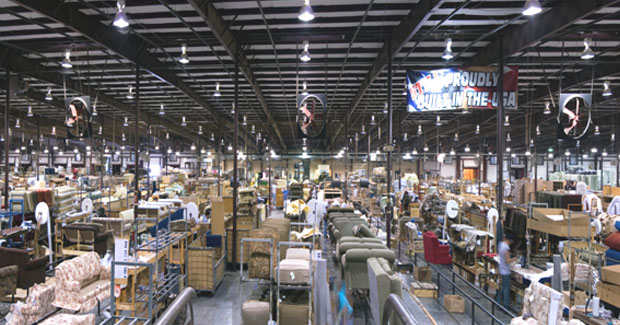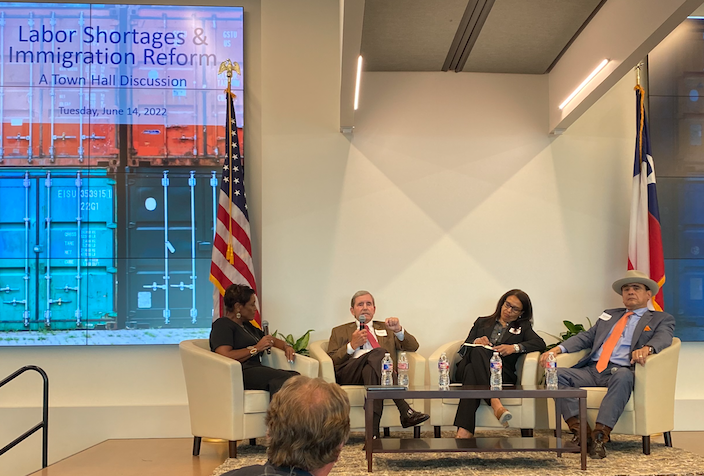The Importance of Manufacturing to Texas and the United States
 In early December, Rubbermaid Home Products announced the closing of its manufacturing plant in Greenville, Texas which will take effect this June. An estimated 490 employees will lose their jobs. Several years ago, Rubbermaid closed its big molding plant in Wooster, Ohio, and moved some of its production to the Greenville plant. Now, those jobs will be lost as well.
In early December, Rubbermaid Home Products announced the closing of its manufacturing plant in Greenville, Texas which will take effect this June. An estimated 490 employees will lose their jobs. Several years ago, Rubbermaid closed its big molding plant in Wooster, Ohio, and moved some of its production to the Greenville plant. Now, those jobs will be lost as well.
This has become a recurrent story over the past decade. From 2001 through 2010, we lost one-third of our U.S. manufacturing base – that’s five and a half million U.S. jobs that were shipped overseas, outsourced, or simply went away. Moreover, The Wall Street Journal reported that, from 2000 to 2009, U.S.-based multinational companies (which account for 20 percent of private sector employment in the United States) eliminated 2.9 million jobs in the U.S. while creating 2.4 million jobs in other countries. As Austin businessman David Hartman has noted, the U.S. manufacturing trade deficit in goods totaled $5.4 trillion from 2000 to 2008. This past year the U.S. ran trade deficits with nearly 100 nations. The late German economist, Dr. Kurt Richebacher, pointed out the devastating consequences of what we are doing to ourselves economically: “Essentially all (U.S.) job losses are high-wage manufacturing, and most gains are in low-wage services. In essence the U.S. economy is restructuring downward, while the Chinese economy is restructuring upward.”
Relatively speaking, Texas is doing better on the manufacturing front than the nation as a whole. More than 836,000 Texans are employed in manufacturing, the second highest number in the U.S. According to our latest monthly employment statistics, Texas has added 25,200 manufacturing jobs over the past twelve months. Texas also exports nearly $160 billion worth of manufactured goods a year. We lead all states in that regard with our nearest competitor, California, next at less than $85 billion annually.
But, we have to do more to rebuild what once was the strongest manufacturing sector in the world.
Texas may be treading water on the manufacturing front, but our nation as a whole is hemorrhaging manufacturing jobs. Our Washington policymakers had better address this manufacturing decline before it is too late.
What can we do to reverse this trend and restore our manufacturing base? One way is for Washington D.C. policymakers to reform the way we tax businesses. The U.S. has the most onerous business tax system in the world with its 35 percent income tax rate and its 7.65 percent employer portion of the payroll tax. Our business tax system rewards private equity moguls for loading up American-based companies with lots of debt (debt is deductible under our current system of business taxation) while punitively taxing employment, capital investment, and savings – the engines of job creation and economic growth. Our existing tax system effectively exports prosperity, and American jobs overseas. We should implement a proposal known as the Hartman Plan in which the U.S. corporate tax system would be replaced by a revenue-neutral, 8 percent business-consumption tax that would be border-adjusted. All goods and services coming into the United States would pay the 8 percent tax while all exports would receive a comparable tax credit or tax abatement as an offset to its company's business-consumption tax. This new approach to taxing business would raise just as much in revenue as, if not more than, the current system of taxation.
Another way to address the decline in manufacturing can be implemented here in Texas. We must rethink our one-size-fits-all approach to education which emphasizes preparing all high school students for a college education.
The greatest demand for jobs is in the skilled trades. Many industries, where skilled workers are essential, currently have an aging workforce that soon will have to be replaced by younger workers with a skill set that matches the needs of the industry. There should be a greater emphasis on vocational and technical education at both the secondary and post-secondary levels to prepare young people for that demand. I believe that it may be time for a whole new model of education. We can begin by looking at the accomplishments of the Craft Training Center in Corpus Christi where they bring in high school students from a number of local school districts and provide them with top notch training in a variety of technical trades such as welding, pipefitting, and electrical work. Those who complete the program have been very successful in landing employment in their respective fields. The skills required for these positions are impressive, and they allow young workers to make a good living and raise a family.
Manufacturing can have a bright future in Texas and our nation. But, it will require us to change a U.S. tax policy which exports American jobs abroad, and to implement educational reforms which will provide our young people with greater opportunities in the skilled trades.








